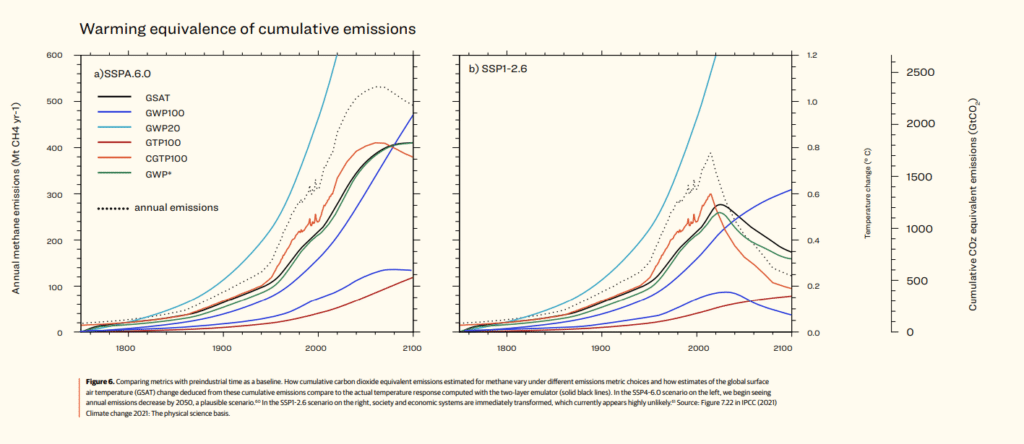In September 2023, three influential New Zealand agricultural organisations (Federated Farmers, DairyNZ, and Beef + Lamb NZ) released a pivotal report. This document challenged the prevailing scientific consensus on methane’s global warming potential and asserted that New Zealand’s agricultural sector faces disproportionately stringent emission reduction demands. This issue is not just local but has wider implications in the context of global climate change strategies.
The report’s core argument
The central claim of the report is that reducing methane emissions by merely 15% from 2020 levels would be adequate for New Zealand’s agricultural sector to achieve climate neutrality. This stance challenges the widely-used Global Warming Potential over a 100-year period (GWP100) metric, which, according to the report, exaggerates the climate impact of short-lived gases like methane. The report argues for a more nuanced understanding of methane, considering its higher heat-trapping capability but also its relatively shorter lifespan in the atmosphere compared to carbon dioxide.
Criticism from climate scientists
Martin Manning, a prominent climate scientist from Victoria University, voices critical concerns about the report. He contends it narrowly focuses on specific scenarios and neglects broader Paris Agreement objectives. Manning highlights the necessity of a global 50% reduction in methane emissions to align with the 1.5 or 2 degrees Celsius global warming targets. Importantly, he points out that the report fails to consider the recent significant increase in methane levels, essentially ‘grandfathering’ in emissions from before the established baseline.

Alternative perspectives
Malte Meinshausen from The University of Melbourne provides a critical analysis of alternative metrics like GWP* in his 2022 report. He highlights that while GWP* offers useful temperature projections, its application as a replacement for GWP in real-world mitigation strategies is fraught with challenges. It could lead to misrepresentation of climate impacts and result in imbalanced mitigation efforts. Changing Markets echoes this criticism, arguing against the complacency of significant methane emitters and the potential misuse of emission reduction claims.
The lead author of the Federated Farmers report, Myles Allen of Oxford University, has stated “We have consistently said we are not advocating the replacement of GWP100 with GWP*. It was proposed as a way of using the information provided by GWP100 to work out warming impacts, and that remains what it is for. It’s a supplement, it’s additional information.”
“If you’re trying to use [GWP*] to say what the responsibilities of a sector are, without consideration of anything else — like the history of a sector, the wealth of a sector, and the other impacts that sector might have had on the environment — then I think that’s inappropriate,” he added.
International trade and market influence
The methodological debate over methane measurement is secondary to the dictates of international trade agreements and market forces. The EU-NZ free trade agreement underscores both parties’ need to comply with the Paris Agreement, implying potential repercussions for non-compliance. Major international buyers, including Tesco and Nestle, have also voiced their expectations for significant methane emission reductions from the global agricultural sector, highlighting the global market’s growing focus on environmental sustainability.
The role of Science-Based Targets
In the quest to mitigate agricultural emissions, the implementation of Science-Based Targets (SBTs) is crucial. The Science Based Target Institute released its Forest, Land, and Agriculture (FLAG) Guidance in October 2022. The guidance uses the metric GWP100 and provides a structured approach to setting, verifying, and benchmarking your emission reduction goals against others. In a globally competitive matter, consistency is key.
Environmental Accounting Services is adept at guiding entities through the SBT process, offering expertise in setting realistic targets and developing effective mitigation strategies tailored to the agricultural and horticultural sectors.
Moving forward: A balanced approach
As New Zealand grapples with these complex issues, a balanced approach is imperative. The report from Federated Farmers and others raises important considerations. Still, it must be weighed against global climate goals and market dynamics to ensure that New Zealand agricultural products’ reputation remains intact. The debate encompasses not just scientific methodologies but also the alignment of agricultural practices with the urgent requirement to address global environmental challenges and market expectations effectively.

